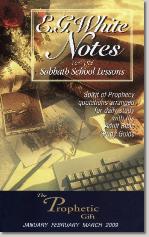|
||||||||||||||||||||
Commentary on "The Integrity of the Prophetic Gift"
Day 3: Monday, February 23, 2009
Day three of this week’s study focuses on a story centered on the prophet Jeremiah, the assassination of Nebuchadnezzar’s governor Gedaliah, fear of Babylonian retaliation and another unpopular word from the Lord. The people of Jerusalem asked Jeremiah to inquire of the Lord on their plan to flee to Egypt for refuge from the Babylonian army. Sure that Jeremiah would give a favorable message to the plan, they were angered when the Lord told them to stay in the city, for they would “…certainly…die by the sword, by famine, and by pestilence in the place [they] desir[ed] to go live.” (Jeremiah 42:22 ESV)
Not only did the people reject Jeremiah’s message, but they also doubted the source of his words saying, “You are telling a lie. The Lord our God did not send you to say [these things], but Baruch the son of Neriah has set you against us.” (Jeremiah 43:2-3 ESV) Baruch happened to be Jeremiah’s friend and scribe. (Jeremiah 36:4; 45: 1-5)
This story is then used as an illustration of Ellen White’s own battles; claims that her writings were not from God and that much of what she wrote was plagiarized. This claim is refuted by a statement she made in The Great Controversy, admitting to the use of other literary sources as needed. A copyright lawyer was then hired to study her writings in regards to plagiarism. The lawyer concluded, “Ellen White was not a plagiarist, and her works did not constitute copyright infringement/piracy.”
The teacher’s comments section of the study then states that God has provided us with biblical guidelines for determining what is true and what is false, but uses a quote from the Society of Professional Journalists Code of Ethics to illuminate these guidelines. The study then asks, “How do we sort out the impostors from those who have a genuine message from God?”
Problems
Plagiarism is a legal term pertaining to copyrighted material. It is defined as “taking without referencing from someone else's writing or speech.” Ellen White did use other writer’s materials, as she admitted to in her quote from The Great Controversy, without giving proper reference when they were actually used. This is plagiarism. If a college student wrote a paper, and while handing the paper to the professor said, “Just so you know, Professor, I did use some ideas and writings from other people wherever I felt they may have explained it better,” but failed to provide specific citations for the works, the student would be flunked. Or maybe even kicked out of school. Simply admitting to it does not negate that it is still plagiarism.
Plagiarism, though, is not really the problem, especially since these copyright laws did not exist during Ellen White’s time. Also, since all true biblical prophecy comes from the same source (God), plagiarism is not an issue because God cannot plagiarize Himself. (University Professors: I know technically you can plagiarize yourself if you turn in the same paper for more than one class, but God is not turning in a paper for credit in your class.)
As in previous study commentaries, comparing Ellen’s hardships to biblical prophets’ hardships to show Ellen White’s prophetic gift is not a test for God’s word. The test for prophets is simply put: if they are false, they are not a prophet of God. (Deuteronomy 18:21-22) This is pretty clear and simple, with no mention of hardship and skeptical attack.
As the teacher’s comments outline, God has provided us with biblical guidelines for determining what is true and what is false. Unfortunatly these guidelines are nowhere to be found in the study notes. Instead the writer uses a quote from the Society of Professional Journalists Code of Ethics talking about “…professional integrity is the cornerstone of a journalist’s credibility.” We are not talking about credibility or integrity. We are talking about God’s word. I think His power is sufficient enough to provide the integrity and credibility needed to let us know it is or is not his word.
Summary:
- Plagiarism is the not the problem. False prophecy is.
- God has provided us biblical guidelines for determining what is true and what is false. We should stick to them.
- Hardship and scrutiny is not a test of a prophet.
Copyright 2009 BibleStudiesForAdventists.com. All rights reserved. Revised February 22, 2009. This website is published by Life Assurance Ministries, Glendale, Arizona, USA, the publisher of Proclamation! Magazine. Contact email: BibleStudiesForAdventists@gmail.com.


The Sabbath School Bible Study Guide and the corresponding E.G. White Notes are published by Pacific Press Publishing Association, which is owned and operated by the Seventh-day Adventist church. The current quarter's editions are pictured above.
Official Adventist Resources
Standard Edition Study Guide Week 9
Teacher's Edition Study Guide Week 9
